Unit 3 How do you get to school?(Section B 1a-2c)
文档属性
| 名称 | Unit 3 How do you get to school?(Section B 1a-2c) | 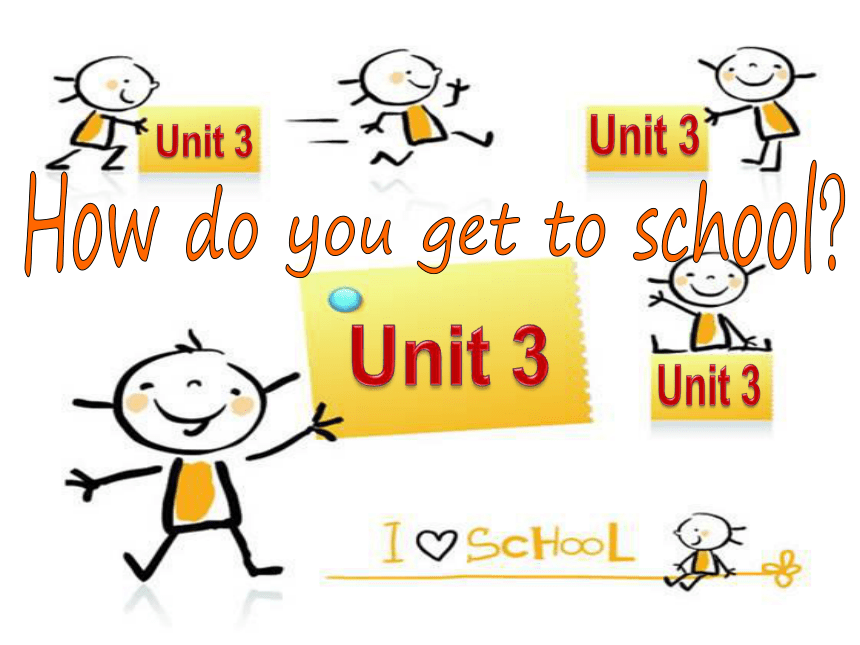 | |
| 格式 | zip | ||
| 文件大小 | 4.3MB | ||
| 资源类型 | 教案 | ||
| 版本资源 | 人教新目标(Go for it)版 | ||
| 科目 | 英语 | ||
| 更新时间 | 2013-03-31 12:39:41 | ||
图片预览

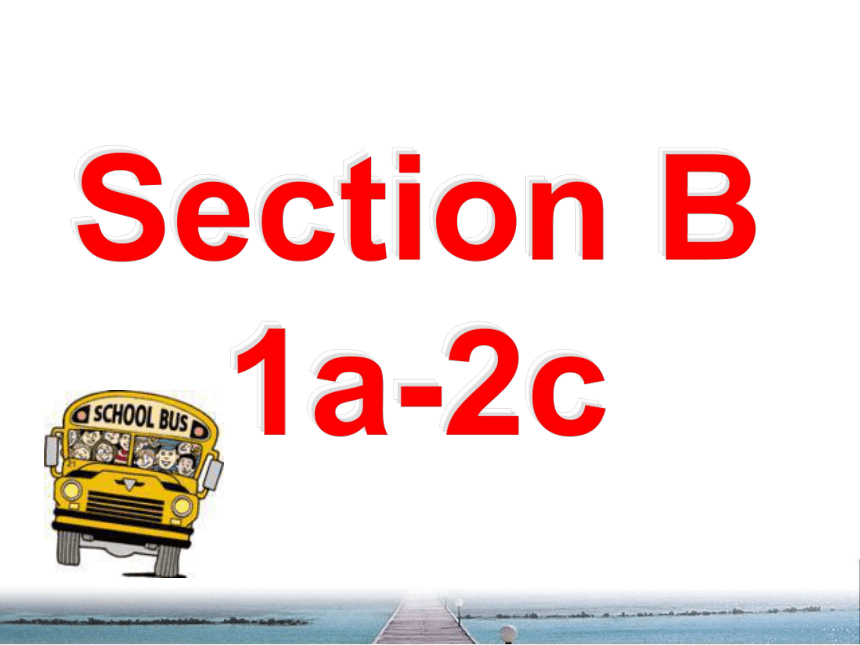
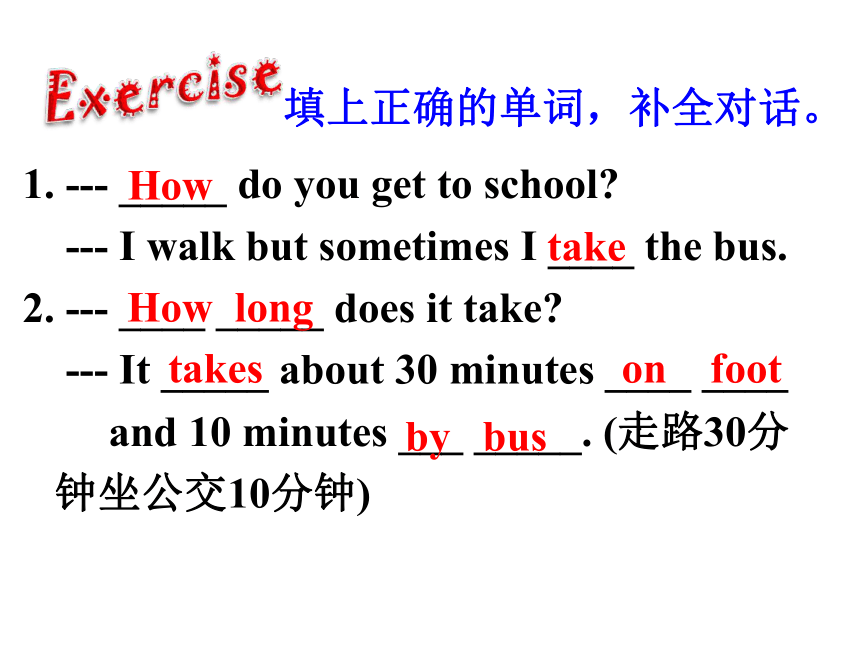
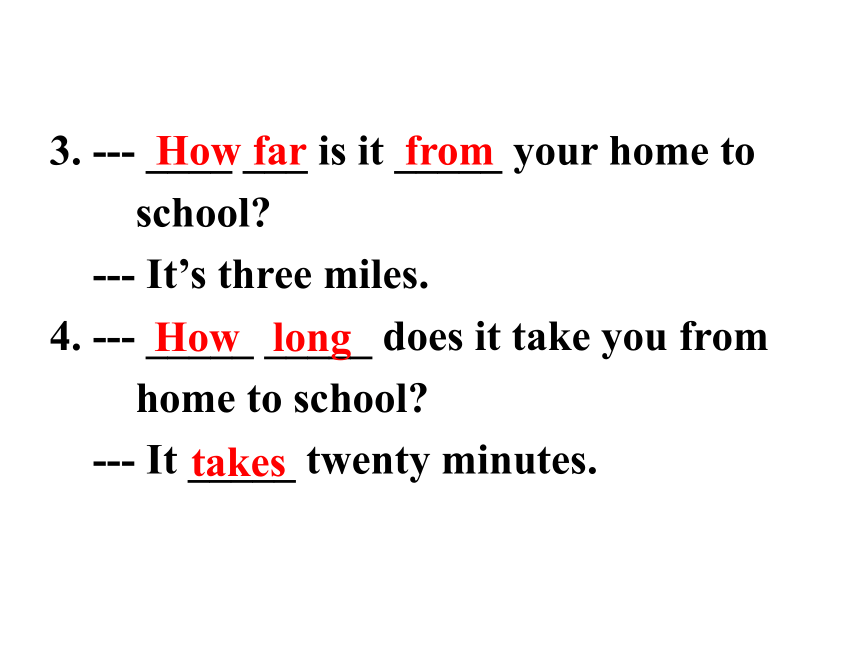
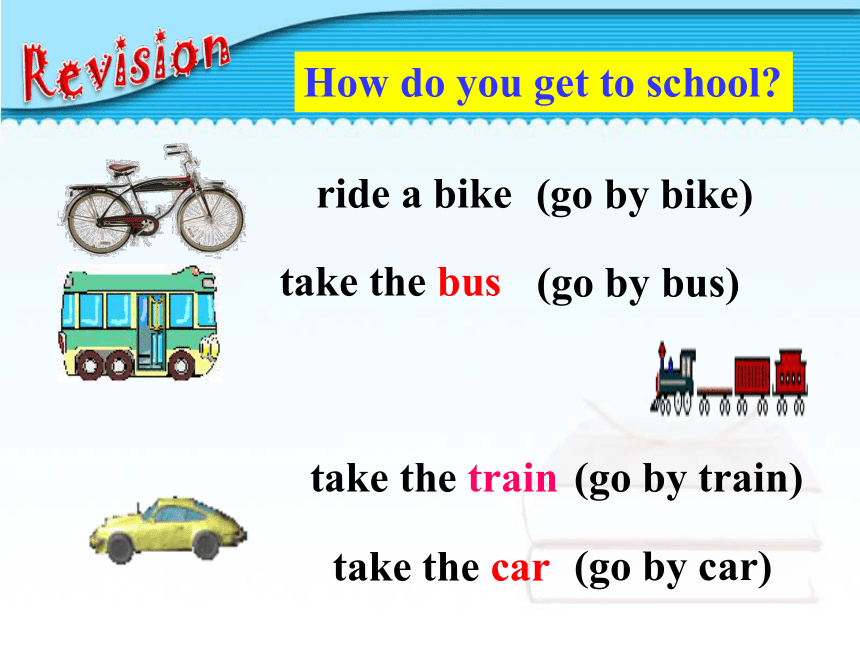
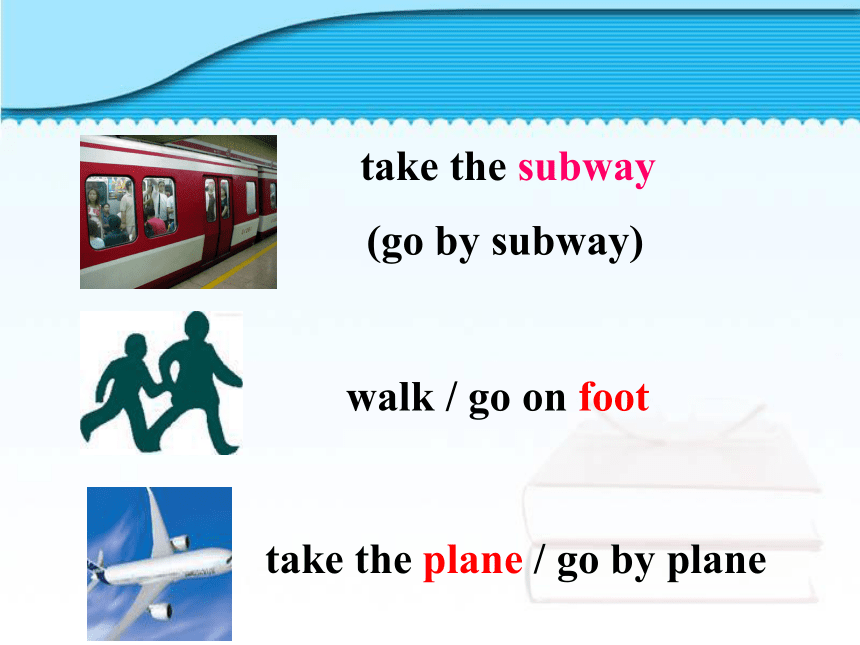
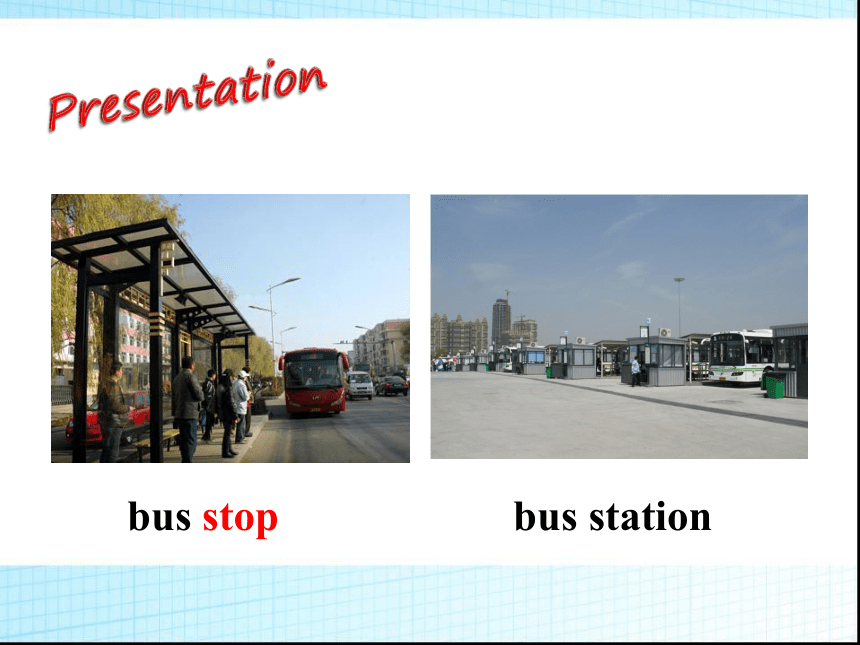
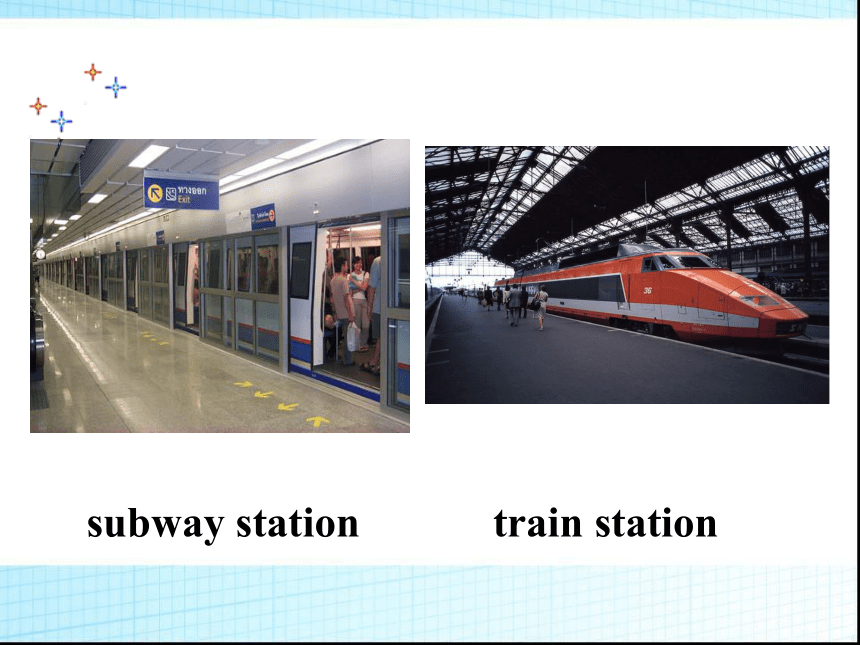
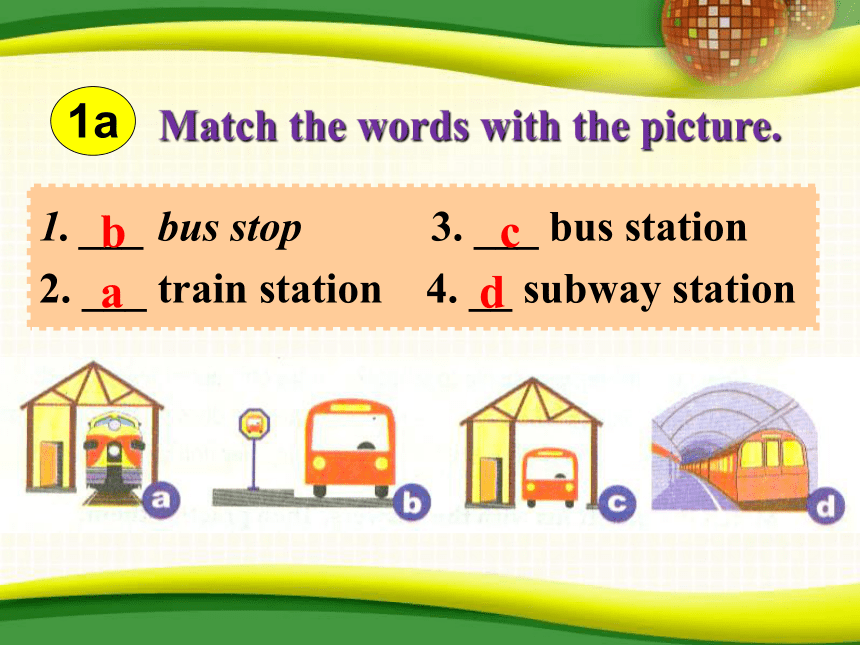
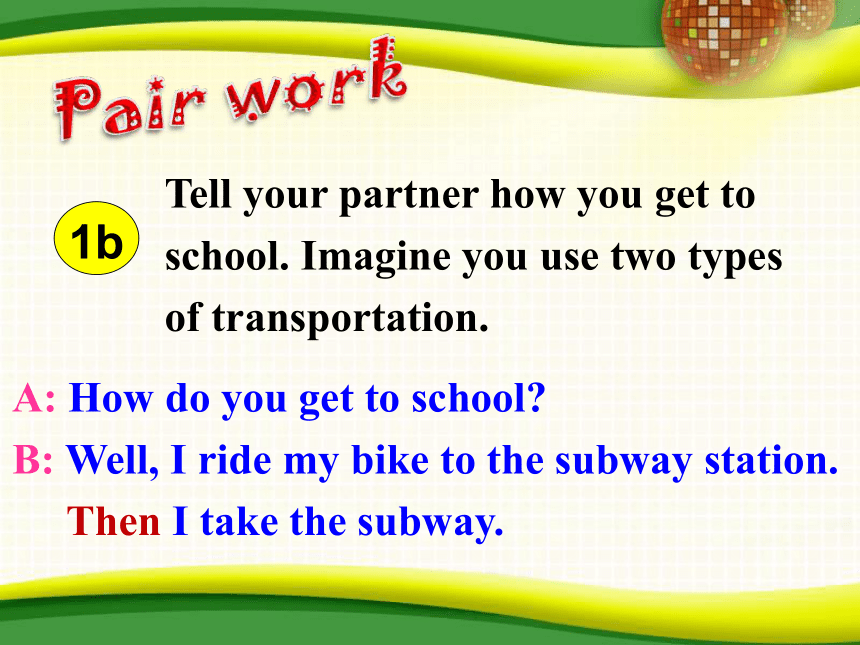
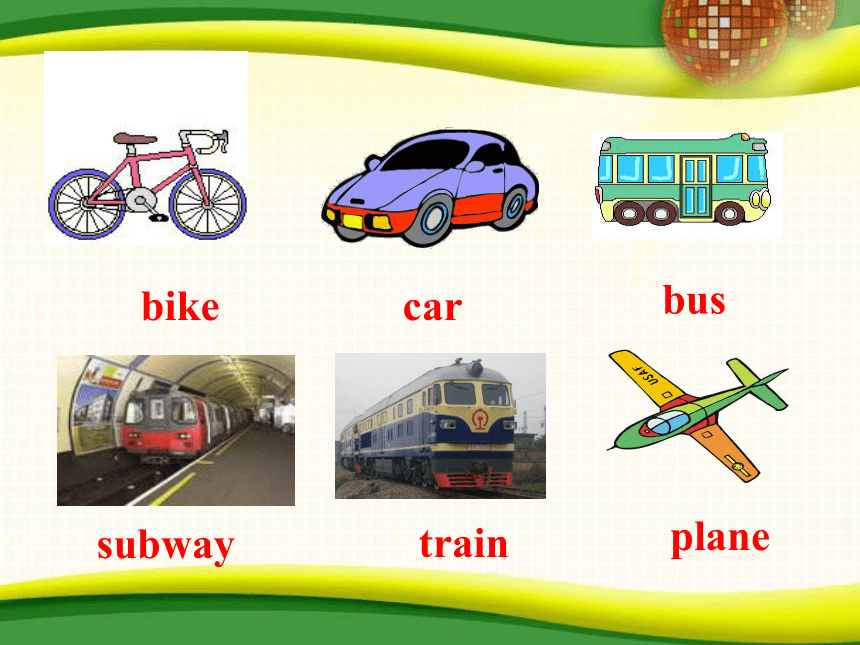
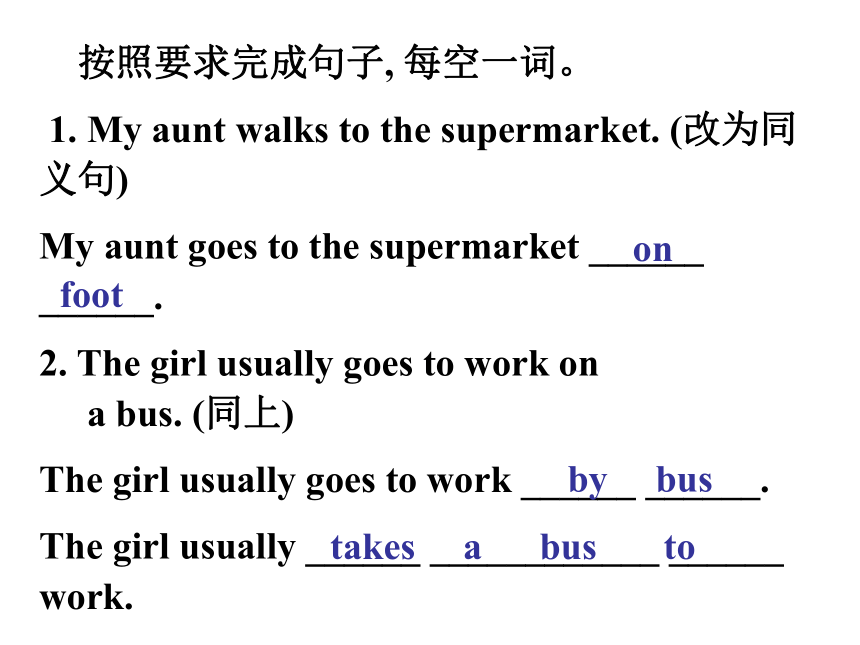
文档简介
课件58张PPT。How do you get to school?Section B
1a-2c
1. --- _____ do you get to school?
--- I walk but sometimes I ____ the bus.
2. --- ____ _____ does it take?
--- It _____ about 30 minutes ____ ____ and 10 minutes ___ _____. (走路30分 钟坐公交10分钟)takesHowHow longtakeby buson foot填上正确的单词,补全对话。3. --- ____ ___ is it _____ your home to school?
--- It’s three miles.
4. --- _____ _____ does it take you from home to school?
--- It _____ twenty minutes. How longHow farfromtakesHow do you get to school?ride a bike(go by bike)take the bus(go by bus)take the train(go by train)take the car(go by car)take the subway(go by subway)walk / go on foottake the plane / go by planebus stopbus stationPresentationsubway stationtrain station Match the words with the picture.1. ___ bus stop 3. ___ bus station
2. ___ train station 4. __ subway stationbadc1aA: How do you get to school?
B: Well, I ride my bike to the subway station.
Then I take the subway.1bTell your partner how you get to school. Imagine you use two types of transportation.bikecar bus trainplanesubway 按照要求完成句子, 每空一词。
?1. My aunt walks to the supermarket. (改为同义句)
My aunt goes to the supermarket ______ ______.
2. The girl usually goes to work on ???? a bus. (同上)
The girl usually goes to work ______ ______.
The girl usually ______ ____________ ______ work. on footby bustakes a bus to 3. I go to the station in a taxi this morning. (对画线部分提问)
______ ______ ______ ______ to the station this morning?
4. It’s 20 kilometers from my home to my school. (同上)
______ ______ ______ ______ ______ your home ______ your school?
5. It takes her two hours to get there. (同上)
______ ______ ______ it ______ her to get there?How do you go How far is it from
toHow long does takeListen and check (√) the things that Mary wants to know? √√1c√Listen again. How does Bob get to his grandparents’ home? Check (√) 1 or 2. 1d√1eTalk about how Bob gets to his grandparents’ home.A: How does Bob get to his grandparents’ home?
B: He goes to the train station.
A: Then, he takes a train.
B: Finally, he takes a bus from the train station to their home.A: How does Nina go to the library? B: First, she…to… C: Next, she…to… D: Then she… To go to the library, first Nina … to ... Next she to … Then she …boatriverbridgevillagevillagerropewaydreambetweenleaveafraidmany = lots ofcross2aLook at the picture and title below. Guess what the passage is about.Crossing the River to School2bRead the passage and answer the questions.Fast readingHow does Liang ling go to school every day?
____________________________________________________________________He goes on a ropeway to cross the river to school.2bRead the passage and answer the questions. 1. How do the students in the village go to
school?
2. Why do they go to school like this?
They go on a ropeway to cross the river to school.There is a very big river between their school and the village, and there is no bridge and the river runs too quickly for boats.3. Does the boy like the this school? Why?
4. What is the villagers’ dream? Do you
think their dream can come true? How?
Yes, he likes this school. Because he love to play with his classmates and also love his teacher who is like a father to him.Their dream is to have a bridge.
Their dream can come true if people all around the world give a hand to them.1. For the students in the village, it is ________ to get to the school.
2. They have to cross a very _____ river between their school and the village.
3. They cannot go by boat because the river runs too _________. 2cRead the passage again. Complete the sentences with the words from the passage.difficultbigquickly4. It is not easy to cross the river on a ropeway, but the boy is not _______.
5. The students and villagers want to have a bridge. Can their dream come _____?afraidtrue1. think of 认为
What does Bob think of the trip? 鲍勃认为旅行怎么样?
【拓展】
What do/does sb. think of …? 某人觉得……怎么样?
(= How do/does sb. like…?)
How does Bob like the trip? Language points2. Between … and … 在……与……之间
between 是个介词,表示在两者之
间。
如:Mary is between Jane and Linda in the line. 在队伍中,玛丽在简和琳达之间。3. cross 横过; 穿越(指横向穿过马路、河等)
Look careful before you cross the road. 过马路前要细心看!
4. year 年;年纪
Mary is only six years old. 玛丽仅六岁。
There are 365 days in a year. 一年中有365天。5. afraid 害怕;恐惧 ; 形容词
(1)be afraid …… 害怕的
The girl is very afraid.
小女孩很害怕。
(2)be afraid of … 害怕 ……
My sister is afraid of snakes.
我妹妹害怕蛇。6. like 像
like 在这里作介词,而不是动词。
The fish looks like a big boat. 那条鱼看起来像条船 。(介词)
Jane likes history very much. 简很喜欢历史。 (动词)
7. come true 实现;成为现实
I think our dream can come true. 我认为我们的梦想能实现。Lanauage points 1. For many students, it is easy to get to school.
对于许多学生来说,上学很容易。
1) many adj.& pron. 许多
表示“多”的意思,可用many, much, a lot of, lots of 等。但是many, much常用于否定句和疑问句,而a lot of等则常用于肯定句。例如: I haven’t seen many English films. 多数英文电影我没看过。(many修饰可数名词复数,表许多) There is much water in the bottle.
瓶子里有许多水。(much修饰不可数名词,表量或程度。)
The boy had a lot of pocket money.
这男孩有许多零花钱。
You have lots of time to finish the work.
你有充裕的时间来完成这项工作。
注:lots of=a lot of 后面接可数名词和不可数名词均可,接可数名词时谓语用复数,接不可数名词时,谓语用单数。 China is a wonderful place and there is _____ to see and enjoy.
A. a lot of B. many
C. much D. many moreA 2) It is + adj. (for sb.) to do sth.
(对某人来说)干某事是……
例如:
It is interesting for me to play computer games.
对我来说玩电脑游戏很有趣。 — It’s very important ___ us to make a plan before a new term.
— Yes. You must try to make it carefully.
A. of B. for C. to B 2. There is a very big river between their school and the village.
在他们的学校和乡村之间有一条大河。
between… and… 在……和……之间
例如:
Can you tell me the difference between Lucy and Lily?
你能告诉我露西和莉莉之间的不同吗?— Guess, how much does it cost?
— I think it costs _____ 15 and 20 dollars.
A. from B. between
C. among D. withB3. There is no bridge and the river runs too quickly for boats.
(河上)完全没有桥梁,而且河水湍急,不宜小船摆渡。
1) 此句是英语否定结构的一种。当no 用于构成否定句,主要用于名词之前,强调否定其后的名词,表现“完全不;根本没有。”例如:
There are no computers in that small mountain village.
在那个小山村里根本就没有电脑。 There is no milk in the fridge.
冰箱里没有牛奶。
2) run 表示“跑,奔;液体的流动”,在不同语境中分别有不同的用法和含义。例如:
I run back to my room and get my bag.
我奔回房间拿自己的提包。
The river runs into the sea.
这条河流入大海。
I have a bad headache and my nose runs a lot. 我头痛得很厉害,而且我的鼻涕很多。 4. One 11-year-old boy, Liangliang, crosses the river every school day.
亮亮,一个11岁男孩,每天过河上学。
1)11-year-old 构成一个复合形容词,修饰名词boy。请注意其中的year之后没有复数词尾-s。这一构词结构较为常见。例如:
a four-day trip 一个四天的旅行
a 30-page book 一本30页的书
a three-room house 一个三间屋的房子2)cross 作动词用,“穿过,越过”的意思。主要表示在物体表面上横穿。如横过马路、过桥、过河等,与go across同义。例如:
Be careful when you cross the street.
过马路时要小心。辨析 cross, across与through
(1) across是介词,有“横跨,横穿,穿越”之意。 例如:
The Great Green Wall is across the northwest of?China.
绿色长城横跨中国西北。
(2) through是介词,“在……之中,透过”的意思,主要表示从物体内部穿过。如穿过森林、隧洞等。例如:
The two friends were walking through the forest.
这两个朋友正沿着森林走。练习:
1. We must ________ the road very carefully.
2. Before going _________ the road, you should look left first and then right.
3. The stream winds _________ the village.
4. The tiger is jumping _______ the burning ring.
5. ________ the street and you can get to the hotel.crossacrossCrossthroughthrough 5. But he is not afraid. 但是他不害怕。
afraid adj. 害怕的;畏惧的
Are you afraid of snakes?
你怕蛇吗?
Children feel afraid when they are at home alone.
孩子独自自己在家, 感到害怕。
I’m afraid to speak in front of other people.
我害怕在其他人面前发言。 be afraid to do sth. 害怕做某事
afraid of sth. / sb. 怕某事/某人
afraid of v -ing 怕做某事
注意:1. afraid是表语形容词
2. I am afraid有时指I am sorry。
I'm afraid we can't come.
很抱歉,我们不能来。 1. 她不害怕在公众场合说英语。(be afraid, in public)
___________________________________
2. — Can you stay here longer????
— _______. I have to be back tomorrow. ??? A. No, thank you? B. I’m afraid not? ?
C. It doesn’t matter? ? D. I’d love toShe isn’t afraid to speak English in public.B 6. He’s like a father to me.
对于我来说,他像一个父亲。
like prep. 像
The baby is like his mother.
= The baby looks like his mother.
这个小婴儿长得像他妈妈。
What is … like? ……怎么样?
What is the weather like today?
今天的天气怎么样? like v. 喜欢
My younger brother likes strawberries very much.
我的小弟弟非常喜欢吃草莓。
It is too hot. I like to swim today.
今天太热了,我想去游泳。I _____ my mother and I _____ her very much.
A. like, like
B. am like, likes
C. look like, am like
D. am like, like
解析:句意为“我像我的妈妈,并且我非常喜欢她。”前一个like为介词,用be like / look like作谓语,后一个like为动词,主语为非单数第三人称,用原形作谓语。D7. Many of the students and villagers never leave the village.
许多学生和村民从未离开过村庄。
leave v. 离开
Please turn off the light when you leave.
走时请关灯。
The train will leave in a second.
列车马上要开了。 “leave for + 地点”表示“动身去某地”
He will leave for Shanghai tomorrow.
明天他将出发去上海。
“leave+ 地点 + for + 地点”表示“离开某地去某地”
Why are you leaving Shanghai for Beijing?
你为什么要离开上海去北京? 一、用括号内单词的适当形式填空。
1. Is it easy for them ______ (get) to school?
2. The river runs too _______ (quick) for boats.
3. His brother _______ (cross) the river on a ropeway every day.
4. Can this dream _____ (come) true? cometo getcrossesquickly5. All the _________ (village) want to have a nice bridge.
6. It takes six hours to get to his _____________ (grandparents) home. villagersgrandparents’二、选词填空。
1. There’s a shop _______ our school and the park.think of, come true, by boat, on a ropeway, between between2. The students in Kaishandao goes to school _______.
3. — How do they cross the big river?
— They go ____________.
4. What do you ________ the new violin?
5. His parents’ dream is to have a big house.
They think it can _________ soon. think ofon a ropewayby boatcome trueTo get to the Great Wall, first they … to ... Next they … to … Finally they …Thank you!
1a-2c
1. --- _____ do you get to school?
--- I walk but sometimes I ____ the bus.
2. --- ____ _____ does it take?
--- It _____ about 30 minutes ____ ____ and 10 minutes ___ _____. (走路30分 钟坐公交10分钟)takesHowHow longtakeby buson foot填上正确的单词,补全对话。3. --- ____ ___ is it _____ your home to school?
--- It’s three miles.
4. --- _____ _____ does it take you from home to school?
--- It _____ twenty minutes. How longHow farfromtakesHow do you get to school?ride a bike(go by bike)take the bus(go by bus)take the train(go by train)take the car(go by car)take the subway(go by subway)walk / go on foottake the plane / go by planebus stopbus stationPresentationsubway stationtrain station Match the words with the picture.1. ___ bus stop 3. ___ bus station
2. ___ train station 4. __ subway stationbadc1aA: How do you get to school?
B: Well, I ride my bike to the subway station.
Then I take the subway.1bTell your partner how you get to school. Imagine you use two types of transportation.bikecar bus trainplanesubway 按照要求完成句子, 每空一词。
?1. My aunt walks to the supermarket. (改为同义句)
My aunt goes to the supermarket ______ ______.
2. The girl usually goes to work on ???? a bus. (同上)
The girl usually goes to work ______ ______.
The girl usually ______ ____________ ______ work. on footby bustakes a bus to 3. I go to the station in a taxi this morning. (对画线部分提问)
______ ______ ______ ______ to the station this morning?
4. It’s 20 kilometers from my home to my school. (同上)
______ ______ ______ ______ ______ your home ______ your school?
5. It takes her two hours to get there. (同上)
______ ______ ______ it ______ her to get there?How do you go How far is it from
toHow long does takeListen and check (√) the things that Mary wants to know? √√1c√Listen again. How does Bob get to his grandparents’ home? Check (√) 1 or 2. 1d√1eTalk about how Bob gets to his grandparents’ home.A: How does Bob get to his grandparents’ home?
B: He goes to the train station.
A: Then, he takes a train.
B: Finally, he takes a bus from the train station to their home.A: How does Nina go to the library? B: First, she…to… C: Next, she…to… D: Then she… To go to the library, first Nina … to ... Next she to … Then she …boatriverbridgevillagevillagerropewaydreambetweenleaveafraidmany = lots ofcross2aLook at the picture and title below. Guess what the passage is about.Crossing the River to School2bRead the passage and answer the questions.Fast readingHow does Liang ling go to school every day?
____________________________________________________________________He goes on a ropeway to cross the river to school.2bRead the passage and answer the questions. 1. How do the students in the village go to
school?
2. Why do they go to school like this?
They go on a ropeway to cross the river to school.There is a very big river between their school and the village, and there is no bridge and the river runs too quickly for boats.3. Does the boy like the this school? Why?
4. What is the villagers’ dream? Do you
think their dream can come true? How?
Yes, he likes this school. Because he love to play with his classmates and also love his teacher who is like a father to him.Their dream is to have a bridge.
Their dream can come true if people all around the world give a hand to them.1. For the students in the village, it is ________ to get to the school.
2. They have to cross a very _____ river between their school and the village.
3. They cannot go by boat because the river runs too _________. 2cRead the passage again. Complete the sentences with the words from the passage.difficultbigquickly4. It is not easy to cross the river on a ropeway, but the boy is not _______.
5. The students and villagers want to have a bridge. Can their dream come _____?afraidtrue1. think of 认为
What does Bob think of the trip? 鲍勃认为旅行怎么样?
【拓展】
What do/does sb. think of …? 某人觉得……怎么样?
(= How do/does sb. like…?)
How does Bob like the trip? Language points2. Between … and … 在……与……之间
between 是个介词,表示在两者之
间。
如:Mary is between Jane and Linda in the line. 在队伍中,玛丽在简和琳达之间。3. cross 横过; 穿越(指横向穿过马路、河等)
Look careful before you cross the road. 过马路前要细心看!
4. year 年;年纪
Mary is only six years old. 玛丽仅六岁。
There are 365 days in a year. 一年中有365天。5. afraid 害怕;恐惧 ; 形容词
(1)be afraid …… 害怕的
The girl is very afraid.
小女孩很害怕。
(2)be afraid of … 害怕 ……
My sister is afraid of snakes.
我妹妹害怕蛇。6. like 像
like 在这里作介词,而不是动词。
The fish looks like a big boat. 那条鱼看起来像条船 。(介词)
Jane likes history very much. 简很喜欢历史。 (动词)
7. come true 实现;成为现实
I think our dream can come true. 我认为我们的梦想能实现。Lanauage points 1. For many students, it is easy to get to school.
对于许多学生来说,上学很容易。
1) many adj.& pron. 许多
表示“多”的意思,可用many, much, a lot of, lots of 等。但是many, much常用于否定句和疑问句,而a lot of等则常用于肯定句。例如: I haven’t seen many English films. 多数英文电影我没看过。(many修饰可数名词复数,表许多) There is much water in the bottle.
瓶子里有许多水。(much修饰不可数名词,表量或程度。)
The boy had a lot of pocket money.
这男孩有许多零花钱。
You have lots of time to finish the work.
你有充裕的时间来完成这项工作。
注:lots of=a lot of 后面接可数名词和不可数名词均可,接可数名词时谓语用复数,接不可数名词时,谓语用单数。 China is a wonderful place and there is _____ to see and enjoy.
A. a lot of B. many
C. much D. many moreA 2) It is + adj. (for sb.) to do sth.
(对某人来说)干某事是……
例如:
It is interesting for me to play computer games.
对我来说玩电脑游戏很有趣。 — It’s very important ___ us to make a plan before a new term.
— Yes. You must try to make it carefully.
A. of B. for C. to B 2. There is a very big river between their school and the village.
在他们的学校和乡村之间有一条大河。
between… and… 在……和……之间
例如:
Can you tell me the difference between Lucy and Lily?
你能告诉我露西和莉莉之间的不同吗?— Guess, how much does it cost?
— I think it costs _____ 15 and 20 dollars.
A. from B. between
C. among D. withB3. There is no bridge and the river runs too quickly for boats.
(河上)完全没有桥梁,而且河水湍急,不宜小船摆渡。
1) 此句是英语否定结构的一种。当no 用于构成否定句,主要用于名词之前,强调否定其后的名词,表现“完全不;根本没有。”例如:
There are no computers in that small mountain village.
在那个小山村里根本就没有电脑。 There is no milk in the fridge.
冰箱里没有牛奶。
2) run 表示“跑,奔;液体的流动”,在不同语境中分别有不同的用法和含义。例如:
I run back to my room and get my bag.
我奔回房间拿自己的提包。
The river runs into the sea.
这条河流入大海。
I have a bad headache and my nose runs a lot. 我头痛得很厉害,而且我的鼻涕很多。 4. One 11-year-old boy, Liangliang, crosses the river every school day.
亮亮,一个11岁男孩,每天过河上学。
1)11-year-old 构成一个复合形容词,修饰名词boy。请注意其中的year之后没有复数词尾-s。这一构词结构较为常见。例如:
a four-day trip 一个四天的旅行
a 30-page book 一本30页的书
a three-room house 一个三间屋的房子2)cross 作动词用,“穿过,越过”的意思。主要表示在物体表面上横穿。如横过马路、过桥、过河等,与go across同义。例如:
Be careful when you cross the street.
过马路时要小心。辨析 cross, across与through
(1) across是介词,有“横跨,横穿,穿越”之意。 例如:
The Great Green Wall is across the northwest of?China.
绿色长城横跨中国西北。
(2) through是介词,“在……之中,透过”的意思,主要表示从物体内部穿过。如穿过森林、隧洞等。例如:
The two friends were walking through the forest.
这两个朋友正沿着森林走。练习:
1. We must ________ the road very carefully.
2. Before going _________ the road, you should look left first and then right.
3. The stream winds _________ the village.
4. The tiger is jumping _______ the burning ring.
5. ________ the street and you can get to the hotel.crossacrossCrossthroughthrough 5. But he is not afraid. 但是他不害怕。
afraid adj. 害怕的;畏惧的
Are you afraid of snakes?
你怕蛇吗?
Children feel afraid when they are at home alone.
孩子独自自己在家, 感到害怕。
I’m afraid to speak in front of other people.
我害怕在其他人面前发言。 be afraid to do sth. 害怕做某事
afraid of sth. / sb. 怕某事/某人
afraid of v -ing 怕做某事
注意:1. afraid是表语形容词
2. I am afraid有时指I am sorry。
I'm afraid we can't come.
很抱歉,我们不能来。 1. 她不害怕在公众场合说英语。(be afraid, in public)
___________________________________
2. — Can you stay here longer????
— _______. I have to be back tomorrow. ??? A. No, thank you? B. I’m afraid not? ?
C. It doesn’t matter? ? D. I’d love toShe isn’t afraid to speak English in public.B 6. He’s like a father to me.
对于我来说,他像一个父亲。
like prep. 像
The baby is like his mother.
= The baby looks like his mother.
这个小婴儿长得像他妈妈。
What is … like? ……怎么样?
What is the weather like today?
今天的天气怎么样? like v. 喜欢
My younger brother likes strawberries very much.
我的小弟弟非常喜欢吃草莓。
It is too hot. I like to swim today.
今天太热了,我想去游泳。I _____ my mother and I _____ her very much.
A. like, like
B. am like, likes
C. look like, am like
D. am like, like
解析:句意为“我像我的妈妈,并且我非常喜欢她。”前一个like为介词,用be like / look like作谓语,后一个like为动词,主语为非单数第三人称,用原形作谓语。D7. Many of the students and villagers never leave the village.
许多学生和村民从未离开过村庄。
leave v. 离开
Please turn off the light when you leave.
走时请关灯。
The train will leave in a second.
列车马上要开了。 “leave for + 地点”表示“动身去某地”
He will leave for Shanghai tomorrow.
明天他将出发去上海。
“leave+ 地点 + for + 地点”表示“离开某地去某地”
Why are you leaving Shanghai for Beijing?
你为什么要离开上海去北京? 一、用括号内单词的适当形式填空。
1. Is it easy for them ______ (get) to school?
2. The river runs too _______ (quick) for boats.
3. His brother _______ (cross) the river on a ropeway every day.
4. Can this dream _____ (come) true? cometo getcrossesquickly5. All the _________ (village) want to have a nice bridge.
6. It takes six hours to get to his _____________ (grandparents) home. villagersgrandparents’二、选词填空。
1. There’s a shop _______ our school and the park.think of, come true, by boat, on a ropeway, between between2. The students in Kaishandao goes to school _______.
3. — How do they cross the big river?
— They go ____________.
4. What do you ________ the new violin?
5. His parents’ dream is to have a big house.
They think it can _________ soon. think ofon a ropewayby boatcome trueTo get to the Great Wall, first they … to ... Next they … to … Finally they …Thank you!
同课章节目录
- Unit 1 Can you play the guitar?
- Section A
- Section B
- Unit 2 What time do you go to school?
- Section A
- Section B
- Unit 3 How do you get to school?
- Section A
- Section B
- Unit 4 Don't eat in class.
- Section A
- Section B
- Unit 5 Why do you like pandas?
- Section A
- Section B
- Unit 6 I'm watching TV.
- Section A
- Section B
- Review of Units 1-6
- Unit 7 It's raining!
- Section A
- Section B
- Unit 8 Is there a post office near here?
- Section A
- Section B
- Unit 9 What does he look like?
- Section A
- Section B
- Unit 10 I'd like some noodles.
- Section A
- Section B
- Unit 11 How was your school trip?
- Section A
- Section B
- Unit 12 What did you do last weekend?
- Section A
- Section B
